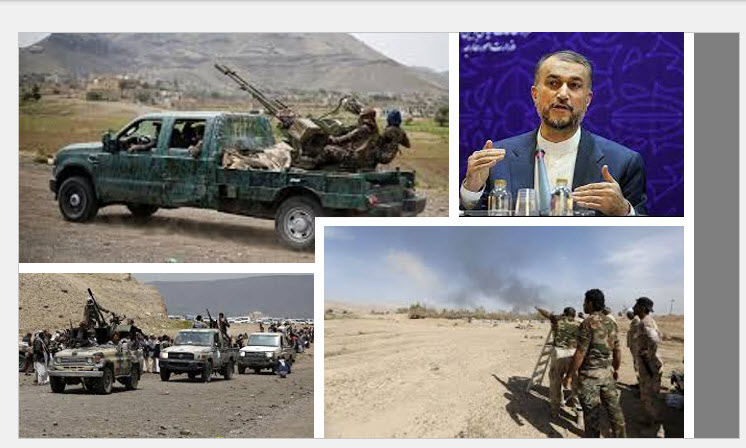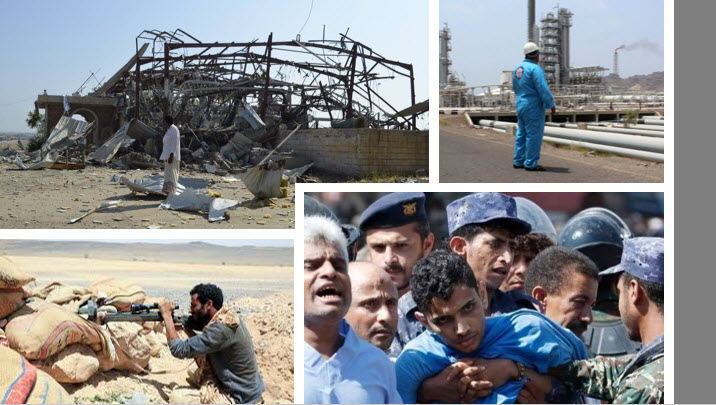
Some experts may see this as a conciliatory move on Tehran’s part, those who have a thorough understanding of the regime’s language and the regional power balance, understand exactly why the regime has become so desperate.
Hossein Amir-Abdollahian, the Iranian regime’s foreign minister, said something that would have been unthinkable just four weeks ago at a meeting in Tehran allegedly called the National Conference on Iran and Neighbors: “We are concerned about the escalation of the war [in Yemen] and we call on Saudi Arabia and the United Arab Emirates to take a political and constructive approach by ending the siege and the war and start engaging in the Yemeni-Yemeni dialogue.”
“The continuation of this situation is not in the interest of the region, and it has not been and will not be in the interest of anyone and the countries involved in this crisis,” Amir-Abdollahian added. While some experts may see this as a conciliatory move on Tehran’s part, those who have a thorough understanding of the regime’s language and the regional power balance, understand exactly why the regime has become so desperate.
The Houthis have been on the attack for the past two months, trying to take control of the oil-rich Governate, the Yemeni government’s final stronghold in the north. However, the Saudi-led coalition was able to carry out some heavy military operations against the Houthis, and they were eventually forced out of the geostrategic Marib region after incurring a high number of deaths. The regime’s officials would be speaking in a different tone if the Tehran-backed militia had taken over Marib.
The Houthis launched a drone strike on a gasoline station near Abu Dhabi’s airport on January 17, killing three foreign workers and injuring many more. The UAE is the most important economic center in the Middle East and is regarded as a global trade transit point.”The Houthis, who are fighting a Saudi-led military coalition that includes the UAE, have said they want to punish the Gulf state for backing militias who are preventing them from capturing oil-producing regions in Yemen,” according to Reuters.
The Houthis appear to have overplayed their hand by attacking Abu Dhabi. The bombings drew outrage from all throughout the world, particularly from Western nations working to end the Yemeni conflict. President Joe Biden and his administration decided to withdraw the Houthis’ terrorist designation in order to aid in the negotiation of a ceasefire in the country. However, in light of recent events, the US administration is said to be reconsidering its decision.

Many members of the US Congress also urged the government to reclassify the Houthis as terrorists, signaling to Sanaa and Tehran that they had gone too far.
“The so-called “giant battalions” succeeded to conquer the center of Harb in the Yemeni province of Marib, which led to the collapse of Houthi militias allied with the Iranian regime,” Al-Sharq al-Awsat said on Tuesday, January 25. The [Saudi-led] coalition forces expanded in the area as Houthi terrorists withdrew to the western flanks of al-Jawiyah and the southern half of al-Abbiyah.”
In light of the Houthi’s latest aggressions, many foreign academics and news organizations are blaming Tehran for the attacks. Prior to the attacks, Iran was in talks with Abu Dhabi and Riyadh to re-establish diplomatic relations and make out its position on Yemen’s military campaign. However, recent events are set to significantly alter the status quo. The recent ground losses in Yemen, together with subsequent political losses in Beirut and Baghdad, have exposed a religious government that is weaker than it has ever been.
The Supreme Leader Khamenei cannot afford another regional blow while coping with frequent upheavals in numerous places at home and a split ruling class that is increasingly at odds on how to cope with the interrelated socio-economic challenges. He’s simply too terrified, and understandably so, that the domino’s dropping bricks would keep bringing him closer to his homeland. The shift in Amir-tone Abdollahian could serve as a warning to world powers attempting to reach a nuclear agreement. The Iranian regime’s negotiating team is just gambling and wagering on a weak attitude on the opposite side of the table, with more to lose than to gain.
Amir Abdollahian experience was during the time that he “cooperated with Soleimani in the foreign policy domain” and promised to “continue Soleimani’s path.” Soleimani was the commander of the Revolutionary Guards (IRGC) foreign arm, known as the Quds Force. Soleimani was in charge of the regime’s terrorist activities abroad. He directed the regime’s proxy terrorist groups in the region, including Iraq, Syria, Lebanon, and Yemen.
MEK Iran (follow us on Twitter and Facebook), Maryam Rajavi’s on her site, Twitter & Facebook, NCRI (Twitter & Facebook) and People’s Mojahedin Organization of Iran – MEK IRAN – YouT

